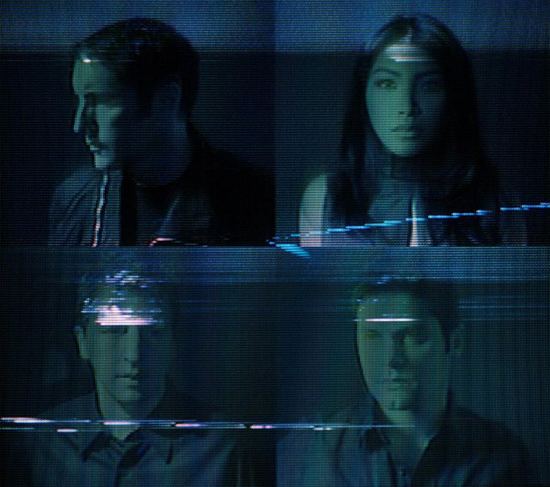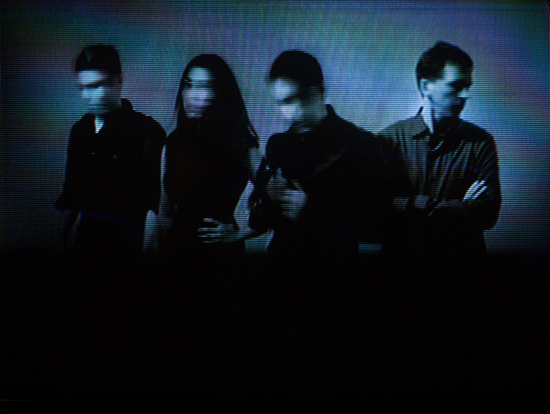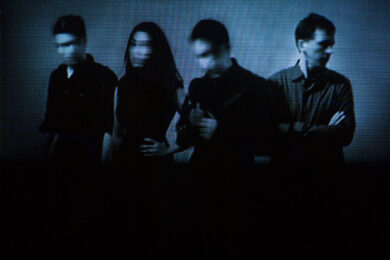With nearly a quarter century of active music making and recording under his belt in one form or another, Trent Reznor could be forgiven for wanting to take an extended break at some point. But in recent years he seems to have moved into full overdrive, even as his flagship identity Nine Inch Nails has gone on an extended hiatus.
One outlet is his new collaborative group How to Destroy Angels, featuring Rob Sheridan, his wife Mariqueen Maandig and another regular musical partner of recent years Atticus Ross, his Oscar co-winner for the soundtrack to David Fincher’s The Social Network. Their second EP, An Omen_, features another understated, beautiful and tense group of songs, with vocals from both Reznor and Maandig but predominantly the latter, as on the striking featured single, ‘Ice Age’.
In an understated, thoughtful phone conversation during a break from the band’s recording sessions for their upcoming full-length release, Reznor delved deep into not only the creative impulses at play during the recording of An Omen_, but extended thoughts on the arc of his career, as well as what still drives him to create and experiment across a variety of fields.
The thing that struck me about this EP, even more so than the first one from 2010, is that space, silence and deliberation felt key throughout, especially on the latter three tracks. Was it always intended to be that way or did that come together as recording progressed?
Trent Reznor: We went into it with this long-range goal of trying to see what develops, to let it present itself and to experiment with a lot of styles and messages and tracks, and how they came together. What we felt was the shortcoming of the first EP was the result of it being just a few weeks in the studio to see what happens. It was kind of demo-ish to me, it felt like you could see the DNA of where it came from, that it hadn’t really become its own thing yet, but it was fun to just to see it come out. In this day and age of music consumption, we felt that rather than letting it sit on the shelf and wait, we felt we should put it out just as a memento of where we were at that time.
Since then we’ve recorded a bulk of music that’s always been living as an album. The decision to sign with Columbia as a means of really reaching out to more people than just the Nine Inch Nails fanbase was really the main reason behind that. So the decision to put a record out meant – should we start with singles, should we put some tracks out? The idea of a strong EP came up, so we extracted some tracks that felt like they could fit together. They were meant to be on the album and some may remain. We spent a couple of months tinkering around with the sequencing and we wrote another track for it, there’s still a lot of glue keeping it all together and I’m pleased with the results. I think it’s an interesting EP that gelled together pretty nicely.
Asking a little more on the collaborative nature of the EP, now that you feel the group has transitioned more into its own thing. Do the four members meet in the middle, does one person present an idea that is then developed, or does it vary, song for song and impulse for impulse?
TR: It comes down to parallel tracks. One is primarily Atticus and myself starting with an idea – we were heavily inspired by old Cabaret Voltaire, starting with the sound of old analog sequencers and things, trying to sync up things in conception, and machines working together in concert but not quite able to do so. I think that concept led to experimentation as it proceeded. The other track would be Mariqueen coming up with melodic ideas – sometimes completely unrelated to what we’re doing – lyrical concepts and fragments of lyrics that were married to this music. It would often go in a direction that Atticus and I didn’t intend it to, and that marriage, that collision, would make it feel a lot different to how a Nine Inch Nails record would feel, or a soundtrack as it evolved.
Your specific work for How to Destroy Angels, as opposed to other activity and projects that you’re doing right now – do you find that working in a group form results in something where you’re challenging yourself, or is it more an extension of a certain part of yourself? Or is it a mix of both?
TR: Hmm, interesting! This is something that may or may not qualify as an answer for that – when Fincher asked me to work on The Social Network score, and I accepted because he was somebody I respected as a person and as an artist, it was a respectful environment but it was an environment where clearly I was working under him to serve what he wanted to make. That’s very different from how Nine Inch Nails operates, where at the end of the day I’m making all the decisions and in that pyramid of power I’m sitting at the top of that, vision-wise, direction-wise, final vote-wise. I found that I really enjoyed being in that respectful environment, not being at the top of the pyramid.
When working with like-minded people on a project that was very interesting, with respect going both ways, it was fun to be in that supporting role. I wasn’t thinking that way out of laziness, I was thinking more that it was interesting to be taking direction. That’s something I’ve learned later in life here, that there is something that I responded to in that. When he asked if I could do The Girl With the Dragon Tattoo right after that I said "Yes, I really enjoyed that!"
Coming out of a few years of doing that, I’ve started to fuck around a bit with Nine Inch Nails stuff, writing music that feels like it could belong in that category, and I found it very invigorating and inspiring because I hadn’t done it for a while, and it feels good to be taking the reins.
With How to Destroy Angels, it was more in that center column of working collectively, about realising that it’s not all my decision, that I think I would have done it this way, but okay, we’ve decided to go that way, and discovering that works, that basic collaboration. It’s the reason people collaborate in the first place. That had little impact on Nine Inch Nails evolved but now I’m enjoying collaborating in various different forms, while at the same time it’s reinvigorating my interest in autonomy as well.

Finally, given all the many different projects you’ve touched on here and are continuing to work on… Obviously the public are only seeing things from the outside as they’re announced or mentioned, like the recently confirmed Beats by Dre project. From the inside, as you look at everything you’re doing now – whether public or private for the moment – do you see everything as part of a continuous process, something flowing whether it goes here, or here, or here? Or is it something done in discrete bursts — now it’s this, now it’s this, and now it’s this? How do you see yourself as a creator with all these things on the boil?
TR: Another in the series of good interesting questions I don’t have predetermined answers for because I’ve answered them before a hundred times! That’s good! You’re throwing me off my game here, I can’t use my sheet of talking points.
In my head, the way I’m seeing it is [that] something changed with me, and I think it was a combination of maturity and getting sober, it had a lot to do with that. A lot of what was prior to that, in the early stages of my career, it was really driven by fear, fear of everything. The act of writing music was cathartic but it was terrifying. It wasn’t something I liked to do. I loved the result but getting to that result was a road marked with failures and self-loathing and everything else. Finally getting a song that I felt I was proud of – that reward, that carrot – kept me doing it. That led to, at that time, getting a record deal, getting to be on stage playing music, and that carrot kept me doing it. I was appreciative and I loved doing it, but I hated the process of creation.
That changed. The Downward Spiral had another mark of terror about it: was I ever going to be able to write another song? Was that just a fluke? I loved playing live, but the act of sitting alone in a room and trying to scrape songs that had guts and the brain and feelings, they never came from a place of ‘Hey, I feel great, let’s write a song!’ It was filled with rage and anger and something where I had to get it out somehow, and I found a way to do that and… anyway. As life progressed and I was close to getting sober and being willing to walk away from all those stupid things, to stay alive after the road I went down went to a terrible place, I started dabbling and seeing if I could write music again. And this would be what led into With Teeth and everything beyond.
To my amazement, I found that the act of creation and writing wasn’t as terrifying because… I don’t know why. I’m not saying I was losing interest in the pain and unpleasantness and things like that, but the process itself wasn’t so entangled with self-loathing. That I could sit down and write this thing and ‘It sucks, that’s okay, no-one has to hear it, I can keep writing more stuff.’
It was a real revelation that I enjoyed the process [of writing music] now, of digging in, rather than loathing it. What this led to – and I think this is coming into answer territory now! – what I’ve tried to focus in on over the last few years is trying to keep an eye on and reminding myself of what’s inspiring: what is the reason I’m doing that, what feels rewarding to work, what feels challenging.
I used to always beat myself up because my idol David Bowie, I’d look at his career through the eyes of someone reading about it, watching it from the distance of time, many writers’ takes on the culture of what he did. It seemed as though he mysteriously change – maybe the construction of what he’d built wasn’t broken yet, but he’d throw it out because he was building a new one, his new persona or his new look or his new sound. At its peak he could walk away from that and try something new, fearlessly.
When I met him in 1995 when we did the tour together, he said to me right off the bat, "We’d love to go out with Nine Inch Nails, you guys are going to blow us off the stage because I’m not trying what people want to hear. I’m going out with this band, we’ve made a difficult new record with Eno" – this was the Outside record – "and we’re going to focus on that, because that’s where my head’s at right now. Nobody really wants to hear that, and I know that, but this is what I need to do right now." I remember thinking, "Well, that’s kind of stupid, isn’t it? But wow." And he was right: he went out and played the show and it wasn’t what people wanted to hear, and it stuck with me.
I’ve beat myself up over the years and I need to try new things, I need to push myself, I need to break the machine, I need to step away from things that feel comfortable to me, and I think I’m still deep in the process of trying that. In the last few years I’ve tried to put a focus on not just repeating the touring cycle process endlessly, trying and working in different contexts. I tried the film scoring world to see what that was like, and I found that there’s great things about it and there’s terrible things about it. Working with different bands – the thing with [Dr.] Dre will reveal itself pretty soon, it’s not a physical product, it’s a platform that feels like it – it was a real challenge to come up with that. Will it work? It may, it may not. But it’s something that’s a puzzle for me to solve, in and of itself challenging, and it’s utilising some skills I have in an unfamiliar and unsafe half of my safety zone kind of way, and it’s been interesting. I tried writing a TV show for HBO and it failed, but we tried! It was scary and uncomfortable and lots of meetings, and it thrust me into something that was unfamiliar and it didn’t always work.
Thinking about [How To Destroy Angels] – to me it feels complementary. I was seduced by, you could say, the Oscar win, but also more than that the process of working with Fincher and this exotic world of film and Hollywood and being invited into the inner sanctum of that. It was interesting, but I don’t see my life going down the path of trying to do a lot of film scores, because most of them are pretty boring anyway, because the films are pretty boring, in a Hollywood world. I’m treating it from the level of "Hey, that was a nice little detour to go down," and I’m hoping to do something like that again, I’m trying to keep things interesting.
At the moment [with] all the stuff on my plate, it feels like although I immerse myself into each one of them [and] I’m locked out to the rest, there’s still a bit of something satisfying something in me. There’s a piece over here that’s scratching that itch, a cohesiveness [due to] really trying to stay focused on things that feel interesting to me, and not resting on my laurels, as I’m tempted to do.



